Key takeaways:
- Choosing the right app development tools and frameworks significantly impacts the developer experience and product quality.
- Learning frameworks like React and Angular streamlines development and encourages best practices, enhancing code maintainability.
- Community support, learning curve, and long-term viability are critical criteria for selecting frameworks.
- Hands-on projects and structured learning habits are effective strategies for mastering new frameworks.
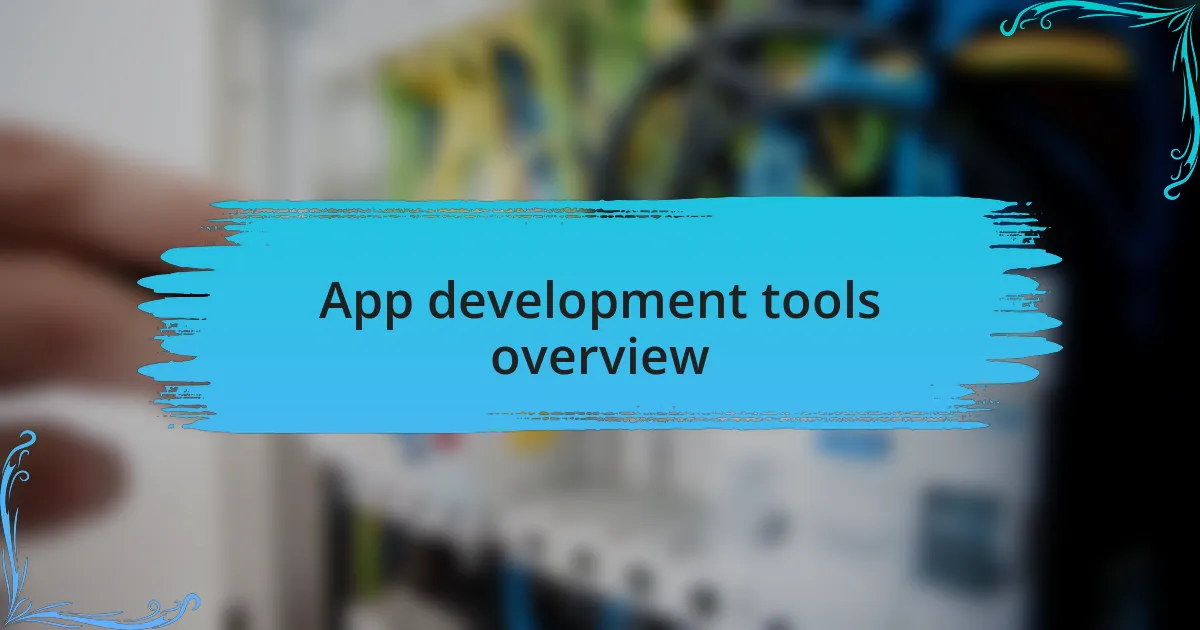
App development tools overview
When I first dipped my toes into app development, the variety of tools available felt overwhelming. I remember scrolling through countless platforms, each offering unique features and capabilities. It really made me wonder: how do you choose the right one?
One of the most striking aspects of app development tools is their specialization. From IDEs like Android Studio that cater specifically to Android apps, to cross-platform solutions like Flutter that allow for a wider reach, the options reflect a diverse approach to meeting developer needs. I often ponder whether focusing on a multi-platform tool provides an advantage in terms of scalability, or if a dedicated environment yields a better product.
As I explored further, I realized that these tools are more than just software; they shape our development experience. I recall a particularly frustrating debugging session that highlighted the importance of a solid toolset. It made me appreciate how some IDEs come equipped with debugging features that can save hours of troubleshooting, making the journey smoother and less daunting. Isn’t it fascinating how the right tool can transform a chaotic process into a more structured one?
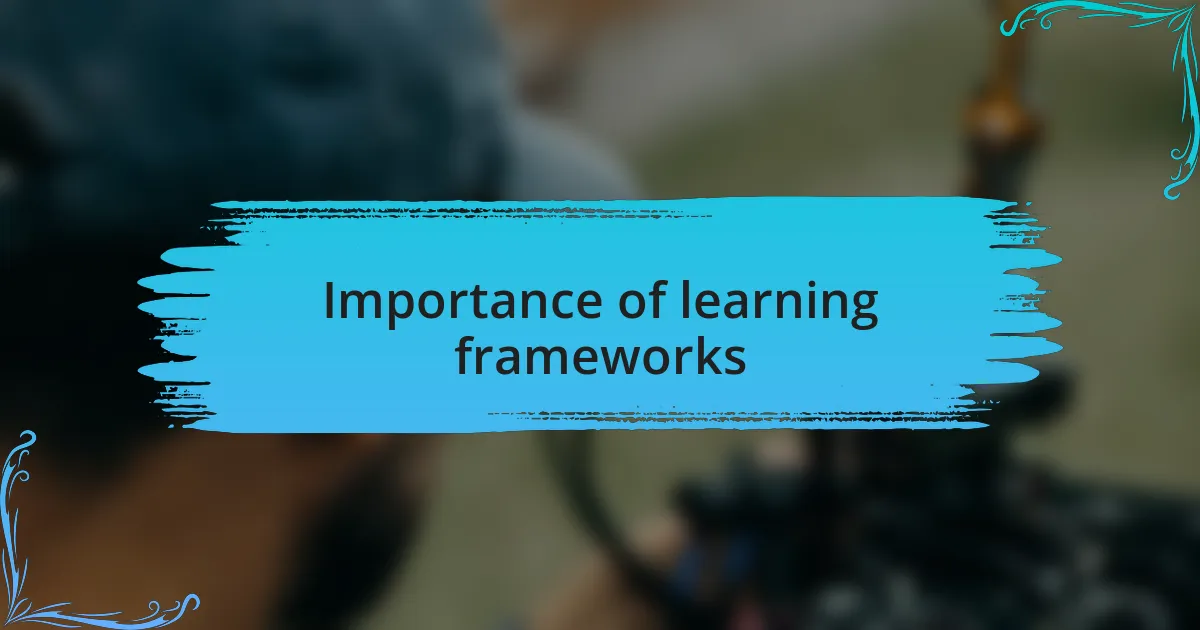
Importance of learning frameworks
Learning frameworks is essential for anyone venturing into app development. I remember when I first explored React; its component-based structure felt like discovering a new language. It was as if a light bulb went off—suddenly, I could build complex applications with much more ease than I had ever imagined. How powerful is it to harness such structure and efficiency?
Frameworks not only streamline the development process but also set the foundation for best practices. After implementing Angular for a few projects, I noticed how it encouraged me to write cleaner and more maintainable code. I often ask myself: what would my codebase look like without the guidance of a solid framework? The thought alone motivates me to continually learn and adapt to various frameworks to ensure my skills remain up-to-date.
In a tech landscape that evolves at breakneck speed, learning frameworks keeps developers competitive. I vividly recall a project where mastering a new framework not only met deadlines but also amazed clients with its performance. It’s rewarding to see how effectively leveraging a framework resonates in real-world applications. Why settle for mediocrity when progressive learning can propel you forward?
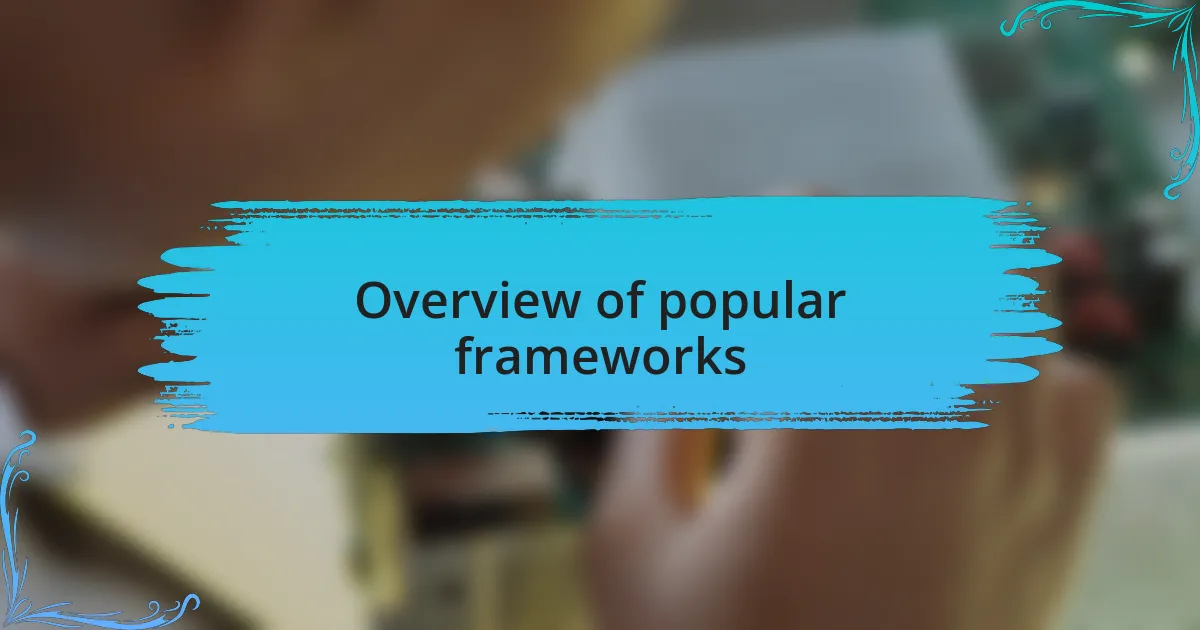
Overview of popular frameworks
Frameworks like React, Angular, and Vue.js are among the most popular in the app development community. I remember feeling the excitement of delving into Vue.js; its simplicity and flexibility helped me create stunning user interfaces almost effortlessly. I often wonder, how did developers manage before frameworks like these became mainstream?
React stands out for its component-based architecture, which I found transformative in structuring applications. While working on a personal project, I realized how much faster I could develop features by reusing components. It’s fascinating to consider how this modular approach not only enhances productivity but also facilitates collaboration among teams.
On the other hand, Angular offers a complete solution with its robust tools and built-in features. I once took on a project that leveraged Angular’s dependency injection, and it changed my perspective on how to manage application complexity. I often ask myself, what would my development process look like without such powerful capabilities? Engaging with these frameworks has undeniably shaped my approach to building applications, making each learning experience both a challenge and a joy.
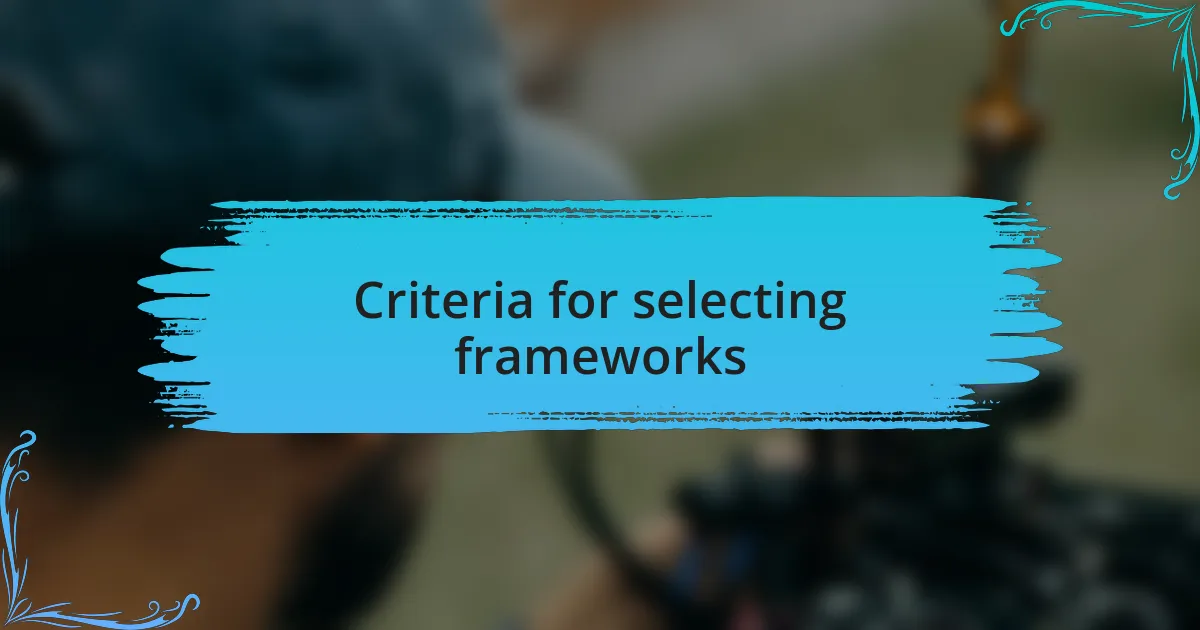
Criteria for selecting frameworks
When selecting a framework, one of the crucial criteria to consider is the community support and resources available. I can still recall the moment I faced a daunting bug in a new framework. The community stepped in with speedy responses and countless tutorials, which felt like a safety net. After all, who wouldn’t appreciate a vibrant community backing their learning journey?
Another vital factor is the learning curve associated with the framework. I remember my first encounter with Angular; it felt overwhelming at first, like learning a new language. However, as I gradually grasped its concepts, the sense of accomplishment was immensely rewarding. Isn’t it intriguing how the initial struggle can lead to such growth and understanding?
Finally, the long-term viability of a framework shouldn’t be overlooked. I have learned the hard way that choosing a framework with a solid roadmap and frequent updates can save a lot of headaches down the line. I often think about my earlier projects built on frameworks that faded away, making me appreciate the importance of selecting wisely. It’s a reminder that investing time in research today can pay off immensely tomorrow.
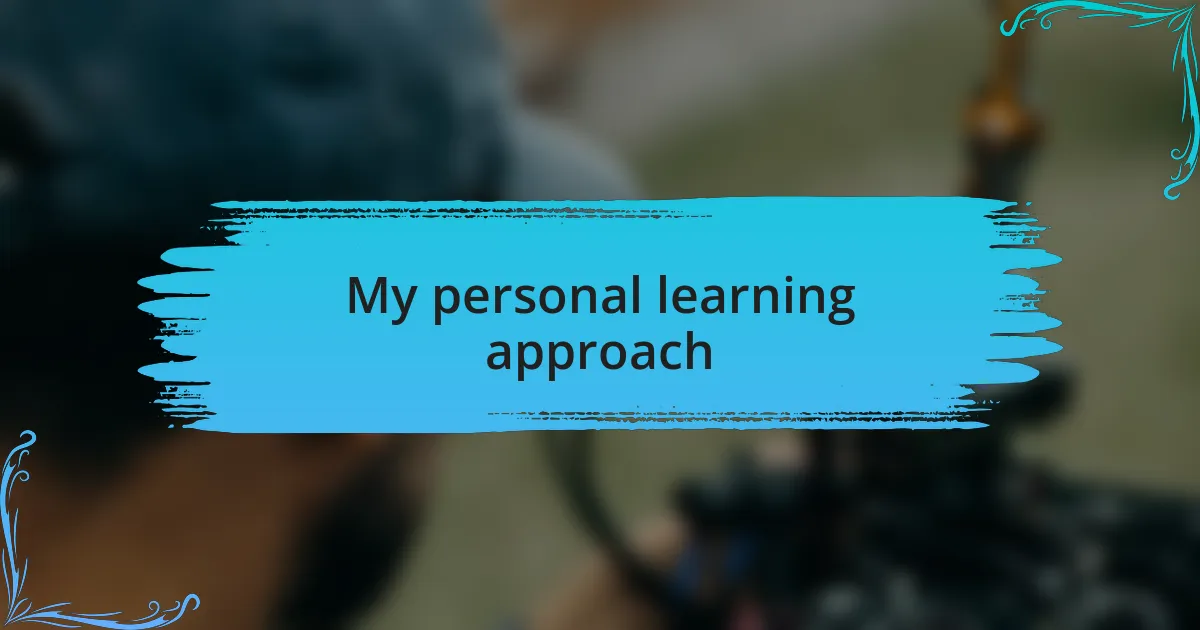
My personal learning approach
When I approach learning a new framework, I always start with a solid foundation of the basics. For example, when I first dove into React, I dedicated an entire weekend to its official documentation. This focused time created a platform upon which I could build my skills. Does anyone else find that initial immersion sets the tone for a smoother learning experience?
I also believe in practical application as a critical part of my strategy. After gaining confidence with Angular, I challenged myself with a small project, transforming an idea I had into a tangible app. The sense of fulfillment I experienced by creating something real from lines of code was exhilarating. Isn’t it amazing how real-world application can solidify concepts in a way that theory alone simply cannot?
Lastly, I often leverage online tutorials and courses, but I don’t stop there. I dive into GitHub repositories, exploring other developers’ work, trying to understand their coding logic. This practice often sparks new ideas and perspectives; I can still remember how dissecting someone else’s project opened my eyes to techniques I had never considered. Have you ever found inspiration from another developer’s work? It’s a reminder that collaboration and sharing knowledge are invaluable assets in our learning journeys.
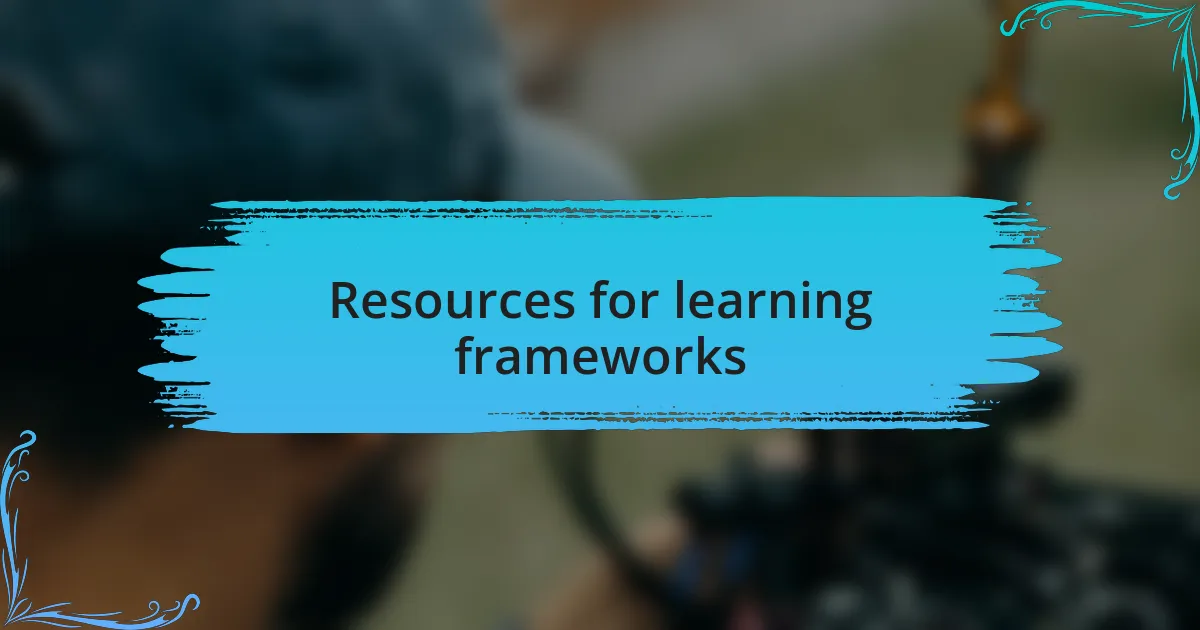
Resources for learning frameworks
When I’m on the hunt for resources to learn a new framework, I often turn to reputable online platforms like Udemy or Coursera. I recently took a course on Vue.js that not only provided video lectures but also included assignments that challenged me to apply what I was learning. Have you ever noticed how structured courses can provide a sense of accountability that self-learning sometimes lacks?
Another great resource I’ve found is community-driven platforms such as Stack Overflow and Reddit. Just last month, I stumbled upon a thread where developers shared their favorite resources for learning Django. Engaging in these conversations made me feel connected to a broader community; it’s remarkable how such exchanges can ignite motivation and offer diverse perspectives. Has a simple conversation ever led you to a breakthrough in your learning journey?
YouTube is another goldmine for tutorials, allowing me to absorb information visually. I distinctly remember following a step-by-step series that taught me how to build a RESTful API with Express.js. It was like having a mentor right in my living room! Don’t you find it enriching to learn from someone who is walking you through the process live, rather than just through text?
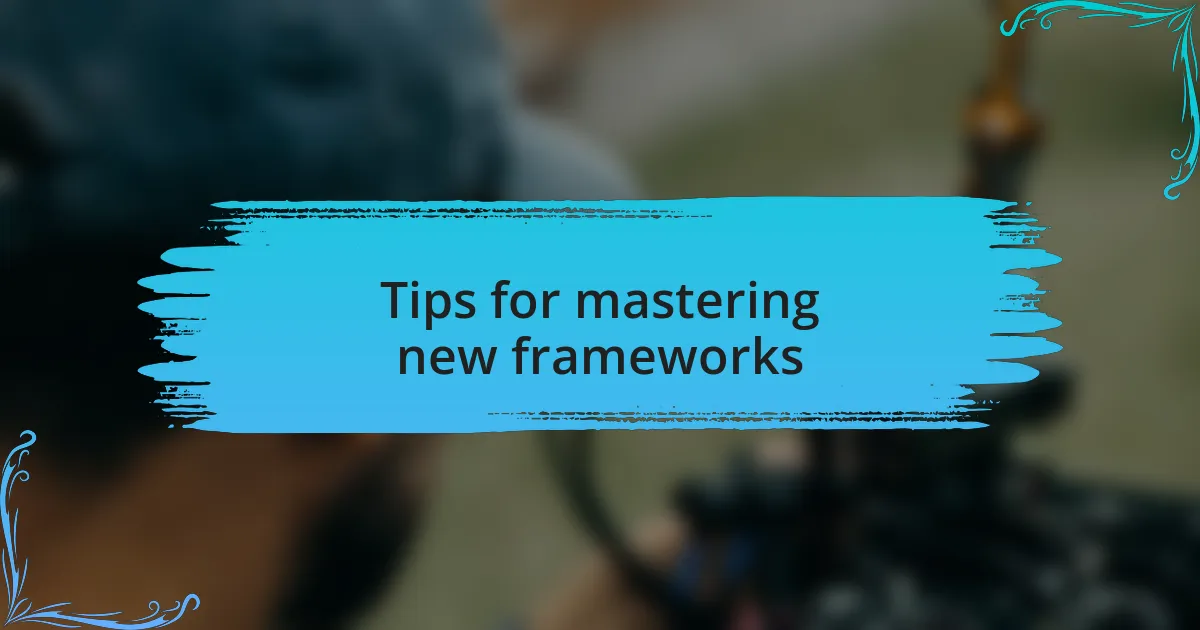
Tips for mastering new frameworks
When diving into a new framework, I find that creating small projects is incredibly effective. For instance, while learning React, I built a simple to-do list app to grasp the fundamentals. This hands-on experience not only solidified my understanding but also sparked a sense of accomplishment. Have you ever realized how completing a small project can boost your confidence with a new tool?
Another tip I embrace is setting a schedule for my learning sessions. I remember struggling to find time, but once I dedicated specific hours each week, my progress skyrocketed. This consistency turned learning into a habit, making it easier to absorb new concepts. Did you know that cultivating a routine can make the whole process feel less daunting and more structured?
Engaging with the community is a game-changer, too. I vividly recall joining a local meet-up where we shared our experiences with various frameworks. That interaction not only enriched my understanding but also built lasting connections with fellow developers who inspired me. Have you ever found that a simple discussion can open your eyes to new possibilities?